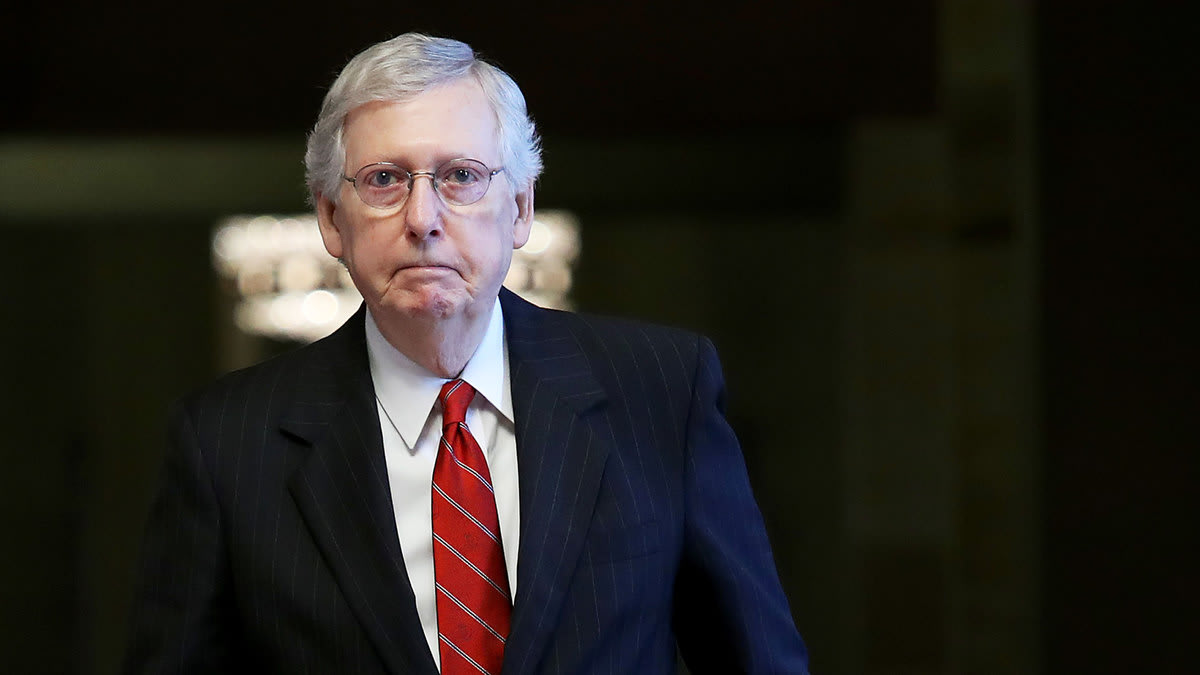The clock is ticking, and GOP leader Mitch McConnell has limited time to show he can act in good faith. President Obama squandered a year of his presidency courting Republican votes that McConnell made sure didn’t happen. President Biden won’t make that mistake. If McConnell pulls his old tricks of obstruction, Biden has moves of his own he can deploy.
It’s really rich that a man who pushed through over 200 judges and three Supremes with bare party-line majorities gets all huffy about Democrats pulling similar maneuvers when it suits them. Democratic leader Chuck Schumer got a temporary respite when the GOP leader withdrew his demand that Democrats keep a 60-vote threshold in place to pass legislation before he would agree to share power in the 50-50 senate.
The Senate itself is on trial. Republican senators are poised to hand a disgraced president a second chance to claim victory by failing to convict. The GOP’s dilemma deepened with the news that Trump’s latest lawyers have walked away after the client insisted that his defense focus on his absurd insistence that he actually won the election.
After a trial that is likely to deepen the partisan divide, can lawmakers act within a reasonable time, weeks not months, to deliver pandemic relief and economic assistance? Or will Republicans reflexively stall negotiations and genuflect before the god of deficit reduction? “The key here, you have to give them some rope and see whether they decide to hang themselves,” says John Lawrence, who served as Nancy Pelosi’s chief of staff during the Obama years. “If the past is any guide, they will build the scaffold.”
Like most Democrats burned by McConnell’s scorched earth tactics, Lawrence doesn’t expect anything different this time around. “They (Republicans) win by inaction. They block everything and blame Democrats for not being able to govern. If the Democrats succeed by changing the rules or circumventing the filibuster, they accuse Democrats of being partisan. It’s classic heads I win, tails you lose.”
Biden learned from his time as vice president when they spent months chasing the votes of a handful of GOP senators. Obama writes in his memoir that then-Senate leader Harry Reid warned him against counting on then-Maine Senator Olympia Snowe, a pro-choice Republican, to vote for the Affordable Care Act. “When McConnell really puts the screws to her, she’ll fold like a cheap suit,” Reid said, and he was right.
Obama was well into his presidency before he gave up on getting any cooperation from McConnell. Lawrence recalls a meeting at the White House in May of 2013 where Obama confronted McConnell on the backlog of his nominees. Obama had all the numbers, 139 of his nominees for the executive and judicial branches compared with 31 for George W. Bush and 18 for Bill Clinton at the same point in their presidencies. ‘You can’t just keep doing this to me,” Lawrence recalled Obama saying.
“That’s the way the rules are, Mister President,” McConnell replied, his tone implying Obama should just quit complaining. It was after that meeting that Reid invoked what was known as the nuclear option by holding a vote where all 52 Democrats said yes to eliminating the filibuster for judges except for the Supreme Court, and all 48 Republicans said no.
The rules can be changed by a simple majority vote by the party in power, and when Donald Trump won the White House and Republicans had the Senate, McConnell eliminated the filibuster for Supreme Court judges, a rule change that paid off handsomely with three conservative justices who could not have gotten 60 votes.
Biden won’t be played the way Obama was. The country’s needs are urgent and if McConnell doesn’t move swiftly after the Senate impeachment trial to signal real cooperation from at least 10 Republicans, it’s game over. Early Sunday, just before the talk shows got underway, 10 Republican senators led by Susan Collins of Maine sent a letter to the White House requesting a meeting with Biden to talk about what they want in the package (pandemic relief) and what they don’t want ($1400 checks) if Biden is sincere about bipartisan unity.
Whether this is a sincere effort remains to be seen. The White House was non-committal with spokespeople repeating the president’s pledge that “the danger we face would not be in going too big or spending too much but in going too small and leaving the needs of the American people behind.”
Biden and the Democrats have the option to go the “reconciliation” route, a term of art that allows the majority in power to pass legislation related to spending and taxes with 51 votes. (It’s how Trump passed legislation to cut taxes in 2017.)
Other ambitious legislation on immigration reform or climate change can’t be passed that way and is still subject to the filibuster. The argument against lifting the filibuster is that the next time around, when the other party is in power, “They’ll do it to us, and we’ll get run over,” says Lawrence. “Well, we’re getting run over pretty well now.”
Obama tried to pick off enough Republican senators to push through his agenda. McConnell made sure that didn’t happen, and more Democrats are coming around to seeing the filibuster as something that has outlived whatever usefulness it might have had. Obama calls it a “relic of Jim Crow.” It was mainly used by Southern Democrats to block civil-rights legislation before McConnell made it a routine roadblock. Leaving the filibuster in place with McConnell as the GOP leader would enshrine minority rule, and we would live with executive orders for a long time—or the rules have to be changed.
At least three Democrats have voiced opposition to lifting the filibuster: Joe Manchin of West Virginia, Kyrsten Sinema of Arizona, and Jon Tester of Montana. And that’s what McConnell hung his hat on to back down from his unreasonable demand that Democrats agree to keep the 60-vote threshold in place. He caved, and now he and his fellow lawmakers are on trial as to whether they can adapt their egos and political needs to the greater needs of the country.
“The Senate as an institution has failed us the longest and the worst since before Donald Trump came on the scene and its failure correlates very strongly with McConnell’s leadership,” says Ira Shapiro, author of The Last Great Senate: Courage and Statesmanship in Times of Crisis.
“To make our government work in a diverse contentious environment, good faith engagement is important. McConnell has not been a good faith player in the past, and I don’t anticipate he will be now.”
The likeliest scenario is that McConnell will be running familiar plays against Biden to win back the Senate in 2022. The difference is his fingerprints will be on them this time. He’s not a behind-the-scenes player anymore, and he can’t sidestep responsibility for the country’s woes so easily. “He is a household name now,” says Shapiro, “and tragically the most powerful Senate leader in history has been such a bad faith player.”
We’ll soon know more about what McConnell might have learned these last four years, or few weeks. “Maybe he had a moment during the insurrection when he realized things had gotten out of hand,” says Shapiro, who is working on another book and recalls a quote from the Vietnam era: “He who rides the tiger can’t choose where he dismounts.”

